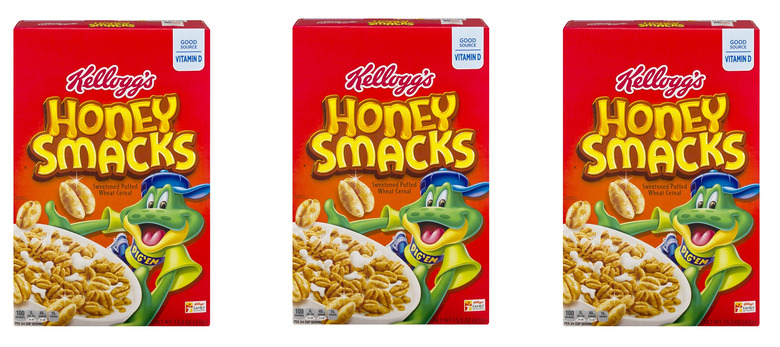Kellogg's Honey Smacks Have Now Poisoned 130 People In 36 States
Health officials are getting sassy on Twitter to remind people that they need to stop eating Honey Smacks. Kellogg's issued a voluntary recall on the cereal in June after 73 people in 31 states contracted salmonella poisoning. It appears that people are still eating it though, because there are now 130 confirmed illnesses and 34 hospitalizations in 36 states, according to the Centers for Disease Control and Prevention.
Things You Didn't Know About the 16 Most Popular Breakfast Cereals
The items included in the recall are 15.3-ounce and 23-ounce boxes of Honey Smacks with "best if used by" dates of June 14, 2018 through June 14, 2019. Retailers should not be selling any Honey Smacks cereal, but the CDC says there have been reports of the product still on store shelves, and the Food and Drug Administration's Center for Food Safety has resorted to tweeting emphatically about it.
#RECALL update: Seriously, get rid of Kellogg's #HoneySmacks in the cabinets! @CDCgov continues to get #Salmonella illness reports linked to the cereal. Now- 130 confirmed infections in 34 states. Do NOT eat. Do NOT buy – retailers can NOT legally sell. https://t.co/wJJzWd7KqG pic.twitter.com/laBH2cXsw3
— FDA FOOD (@FDAfood) September 4, 2018
"#RECALL update: Seriously, get rid of Kellogg's #HoneySmacks in the cabinets!" The FDA's food safety account wrote on Twitter. "@CDCgov continues to get #Salmonella illness reports linked to the cereal. Now- 130 confirmed infections in [36] states. Do NOT eat. Do NOT buy — retailers can NOT legally sell."
Get. Rid. Of. The. HoneySmacks. If they're still in your cabinet, toss them! https://t.co/IAzT3oHfpk
— U.S. FDA (@US_FDA) September 4, 2018
The main FDA account retweeted the note, writing: "Get. Rid. Of. The. HoneySmacks. If they're still in your cabinet, toss them!"
People who consume this product could become infected with salmonella. Symptoms include diarrhea, fever, and abdominal cramps. The sickness normally lasts four to seven days, and most people recover without treatment. According to the FDA, children are most likely to get salmonella poisoning, but the elderly and those with weakened immune systems are at a higher risk, too.
In some cases, diarrhea may become so severe that people need to be hospitalized. The infection could then spread from the intestines to the bloodstream and other sites, which could prove fatal unless the patient is treated with antibiotics.
Harmful pathogens can exist anywhere. Goldfish and Ritz crackers, raw chicken, romaine lettuce, McDonald's menu items, eggs, shredded coconut, dog treats, and corn are just some the contaminated foods responsible for sickening people this year. Make sure to protect yourself by following these easy tips for avoiding food poisoning.
